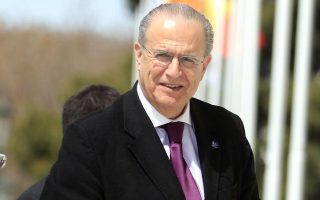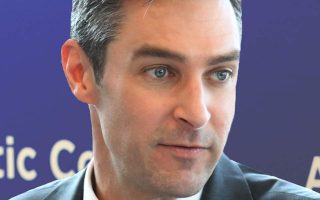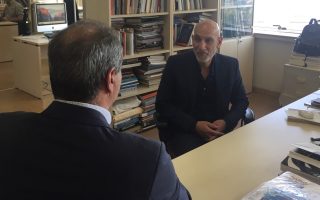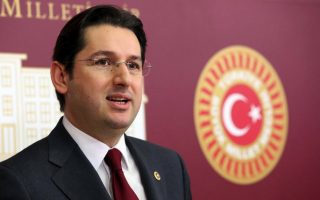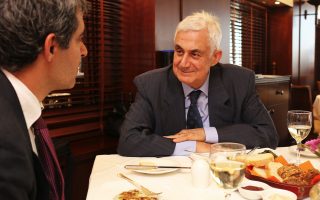Geoffrey Pyatt: ‘A strong Greece is a natural partner for the US’
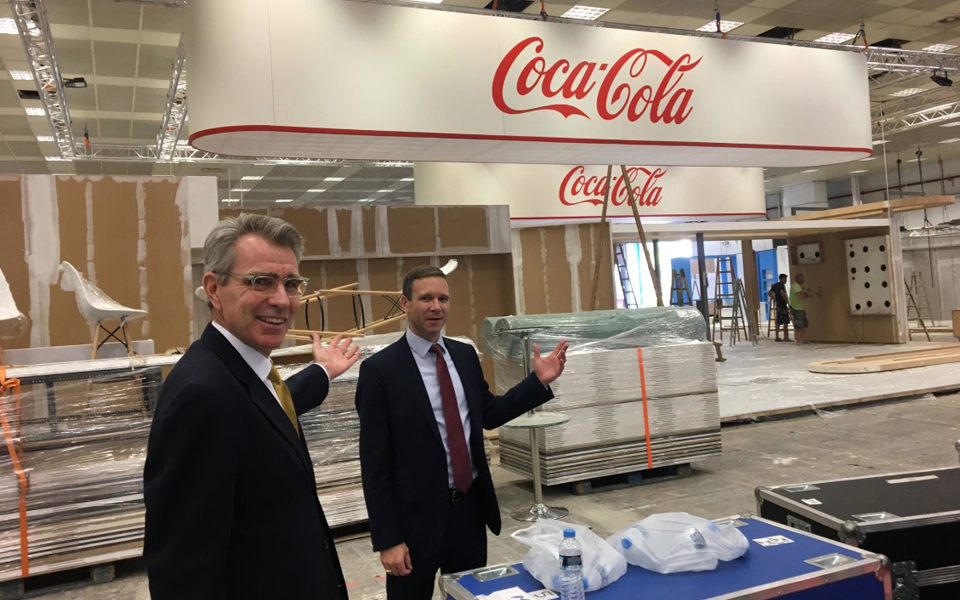
The United States and Greece share common interests and have a common vision for the broader region, the American ambassador in Athens, Geoffrey Pyatt, told Kathimerini’s Sunday edition.
Speaking days ahead of the opening of this year’s Thessaloniki International Fair (TIF), at which the US will be the country of honor, Pyatt said that Washington regards Athens as a “natural partner” in the Eastern Mediterranean and in efforts to keep Ankara anchored to the West.
The American diplomat described Athens as the “preferred” partner in the Western Balkans and stressed that Greece’s economic recovery is a priority for Washington in the region.
The USA is the 2018 Thessaloniki International Fair’s honored country. Is this the culmination of the close cooperation between our two countries, or rather another milestone in an ever closer relationship – especially since the beginning of the Greek crisis?
I’m very excited about this. I was in Thessaloniki a few days ago. I was really pleased to see both how the American Pavilion is coming together but also the energy level among everybody, with Central Macedonia Governor Apostolos Tzitzikostas with Thessaloniki Mayor Yiannis Boutaris. People recognized this as a major moment in the US-Greece relationship and US engagement with northern Greece. I don’t think it’s an exaggeration to say this is the most significant thing that the US government has done in northern Greece since the Marshall Plan period just in terms of the scale of our engagement on the broad array of US-Greece issues, not just the business-to-business and investment areas that we are highlighting with US Secretary of Commerce Wilbur Ross but our people-to-people relations, the diaspora, educational ties, our military and security relationship, the fact that we will have the 6th Fleet flagship, the USS Mount Whitney, in Thessaloniki harbor during TIF. We really are trying to highlight everything that is the US-Greece relationship and you saw Governor Tzitzikostas’s press release after our meeting and the emphasis that he placed on the strategic direction. I think that what is really important is that it comes in the context of a very important year for Greece and northern Greece, in particular the end of the bailout, the economic opportunities that that represents, the implementation of the Prespes agreement [on a name for the Former Yugoslav Republic of Macedonia] with all that that means for the economic relationship with all of your northern neighbors and the role that Greece plays in terms of encouraging the continued progress of the countries of the Western Balkans towards the Euro-Atlantic community, the progress on some of the key energy projects like the FSRU [floating LNG receiving, storage and regasification unit] in Alexandroupoli and the IGB [Gas Interconnector Greece-Bulgaria Pipeline], and I think we’re enthusiastic about the regional dimension with AmCham’s energy conference, which involves participation not just from Greek and American companies but also other regional governments. We have our ambassador from Nicosia coming to be part of the US team at TIF. So it really highlights the role that we have tried to emphasize to Greece as a regional pillar and the investment that the US is making in our relationship with Greece and all the people in Greece at a moment when geopolitics is returning to the Eastern Mediterranean, Balkan and wider Black Sea region in a big way. So this is a very important week for the Greek-US relationship but it’s not the end of the road. It is a new and ambitious phase of our engagement bilaterally and especially our engagement with northern Greece.
What does the US presence at TIF signal?
How impressive it was in Thessaloniki in how we moved the needle in terms of perception of the US in northern Greece. I’ve said publicly in the past – when I first went to Thessaloniki two years ago – Governor Tzitzikostas and a couple of other people I talked with at the time said to me, “Ambassador, where are the Americans? How come we don’t see you guys up here anymore?” I don’t think that anybody’s going to say that again, not for a while. Because the Americans are back in a really big way. What’s heartening to me as an American ambassador is that there is such a positive reaction to that. It is an initiative that sparked a lot of positive sentiment, especially among the people of northern Greece, which is a region that was particularly hard hit by the economic crisis, because you saw so much deindustrialization, and now there’s a sense of real possibility. We are bringing our best game. This is as good as it gets. We are doing it with strong support from the Greek government but also the opposition political forces, but we are trying to do so in a way that captures imaginations but also builds a foundation for our long-term engagement and continued partnership.
Will TIF be a herald of US investment in Greece? What are your expectations?
Good news is there is a very strong US corporate participation. The pavilion is fantastic. I was able to walk through it. We have more than 50 American companies participating. Many are bringing their senior leadership from their US or European HQ and I think that what it reflects is that American companies are looking with fresh eyes at the opportunity that Greece represents, both in terms of this market of 11 million people, but also the role that Greece and Thessaloniki can play as a platform for the wider region. To answer your question on whether there is going to be new investment, that’s going to depend on the signals that the government will send, but we have done a lot of work to put Greece back on the radar scope, and the government, the people and the businesses of Greece are going to have a fantastic opportunity. When I was in Thessaloniki last week I had the opportunity to meet many of the key association leaders and everybody in the Thessaloniki business community understands that this is an unbeatable opportunity to tell their story and make a pitch that otherwise would not be possible.
Regarding the geopolitical role that you say Greece can play today, what do you envisage? Greece has been suffering from an almost unprecedented crisis. I have been through all your recent speeches about Greece being the epicenter of geopolitical crises all around the region. Of course it is important geographically, but isn’t it too much for such a small country to play such a big role?
I think that it is clear to us – and this is not a policy judgment, this is an analytic judgment – Greece is playing a more ambitious foreign policy role today because it’s able to. For several years when basic issues were at stake – Was Greece going to remain in the eurozone? Was the Greek financial system going to stay afloat? – when those existential questions were on the horizon it was very hard to think ambitiously about the role that Greece plays in the Eastern Mediterranean or the relationship that Greece can leverage between Israel, Egypt and Cyprus, or how Greece works with the countries in the Western Balkans. But that’s now changing. The return to economic growth in Greece has enabled the government to think more ambitiously about its regional agenda and the common thing with the US is that that agenda compliments very much our interests and our vision for the wider region whether in terms of the future of the Western Balkans or the importance of dealing with threats like terrorism, piracy, illegal migration in the Eastern Mediterranean or helping to ensure that your big neighbor to the east remains anchored in Europe and European institutions.
Do you think that the current crisis between the US and Turkey is also affecting the relationship between Greece and Turkey? And how can Greece help in keeping Turkey anchored to the West?
It’s very clear as I said that Greece and the US share very similar interests vis-a-vis Turkey. That was apparent when Prime Minister Alexis Tsipras was in Washington and he was asked by an American journalist about whether Turkey was still a democracy and whether it should be part of NATO. He offered a very strong defense of engagement with Turkey, which is similar to the US defense of our engagement. I think the US-Turkey bilateral relationship is going through a difficult moment right now but it has to stand on its own merits. But it certainly helps the US to have Greece as a strong advocate within the EU of keeping doors open to Turkey, continuing dialogue on things like how to build on the EU association agreement and making clear that Europe’s doors remain open to Turkey.
What are America’s priorities in the broader region and how is Greece involved in all that?
Our number one priority in Greece is to help support economic recovery, because our strategy relying on Greece as a pillar of stability depends on a successful Greek exit from its economic crisis and the restoration of economic growth. We see that as more possible today than it’s been in many years. We are obviously very concerned about malign actors in this region, the issues around the role that Russia continues to play in the wider region and also the question of China, how we all navigate around the emergence of China as an important and inevitable economic and investment player in the wider Central and Eastern European region. Obviously the number one issue has to be the economy. We are very focused on our counterterrorism law enforcement relationship. Greece occupies a particularly challenging geography, you are Europe’s back door. And so all the issues of foreign fighters, ensuring that the defeat of the ISIS caliphate doesn’t result in terrorism and radical ideology migrating back in to Europe; the work that is made every day by the Greek police and law enforcement is important in that regard. But as you see with TIF, we are also committed to invest in our long-term people-to-people ties. One of the reasons why we have such a positive relationship today is because of the investment that we made over the years in programs like Fulbright which helped to build Greek human capacity but also the human relations, people-to-people relations between our two countries. There’s a lot more that we can do in that area. So I’ll be very happy that we’ll have at TIF our new Assistant Secretary for Education and Cultural Affairs Marie Royce. It’s the reason why we have invested so much in programs around TIF, like entrepreneurship, digital information, these are long-term investments in our people-to-people ties.
A few days ago, convicted November 17 terrorist Dimitris Koufodinas was granted another furlough. It was not the first time. Would you like to comment on that?
We have a difference of opinion on this. You’ve seen our spokesperson’s statements. That doesn’t take away from our excellent operational cooperation, but we have a different perspective on the issue of Mr Koufodinas.
‘Our defense relationship today is at an all-time high’
Washington and Athens have developed close cooperation in terms of defense. How could that further evolve?
Our defense relationship today is at an all-time high. That’s why we wanted defense issues to be reflected in our presence at TIF. I mentioned the USS Mount Whitney; we also have a strong presence from US defense companies like Lockheed Martin at the American Pavilion. We’re going to have LM simulators for F-16s and F-35s as part of the TIF exhibition. Our defense and security relations are again rooted in shared values, years and years of investment but also a strong belief on the part of the US that a stable and secure Greece helps to advance US interests in wider regional stability. You know how important Souda Bay is in terms of our overall regional operations. We’ve made significant progress with Greece in recent months with, for instance, MQ-9 deployments at Larissa, the expansion and increasingly ambitious Iniochos exercises, the rotations that we got of American helicopters through Thessaloniki and Alexandroupoli. I expect this kind of operations to continue. And the important thing is that we do so with strong support and partnership with our Greek allies and our Greek military counterparts. I’m very glad about the fact that we have exceptionally strong relationships today between the Chief of the Hellenic National Defense General Staff Admiral Evangelos Apostolakis and the Greek service chiefs with their American counterparts, and we will continue to invest in that. We are also taking advantage of the large US presence that we have at TIF. Among the visitors will be Senator Ron Johnson, who is the chairman of the Senate’s Europe subcommittee. He came to see me last year at Souda Bay. This year he is going to be at TIF and we are very glad to take him to see NRDC [NATO Rapid Deployable Corps], which is not very well known but has taken over the NATO LANDCOM responsibility, getting an opportunity to see what Greece is doing as a regional and as a NATO ally not only in the Eastern Med and southern Aegean, which is what you focus on from Souda Bay, but also to the north, increasing cooperation with our NATO allies in Bulgaria, longstanding involvement in the Black Sea region (participation in the Sea Breeze exercises). So TIF is a good opportunity to put a positive spotlight on what I see as being one of the strongest pillars of our overall cooperation today, which is the way our military and security institutions are able to work together.
Some US military capabilities have been transferred to Greece. Could you see that being somehow enhanced?
It is really up to the government. That’s a sovereign Greek decision. Certainly from the US we are grateful for the support that we have received and the fact that we continued to get a green light from the Greek government, for instance with the extension for the MQ-9 presence in Larissa. It is obviously good for our security, it helps us to advance our shared NATO missions, but we think it is also good for Greece. We are committed to be good allies. Importantly, all of these deployments create opportunities for Greece as well. So when we have our Naval Special Forces at Souda Bay, that creates opportunities to exercise with the Hellenic Special Forces, helping them to develop their capacities. We have a pretty significant program of equipping also for the Hellenic Coast Guard’s Underwater Operations Unit (MYA) units to enhance the capacity of the coast guard in things such as maritime interdiction and boarding. The helicopter deployments through Alexandroupoli and Thessaloniki have been important and successful. It demonstrates the capacity and flexibility that’s inherent to our NATO relationship and NATO capacity across Europe.
You mentioned the East Mediterranean and increased Greek responsibilities. That also creates greater needs in terms of equipment. We’ve recently seen the F-16 upgrade agreement, Kiowa helicopters and Chinooks. There is a discourse, at least within the Greek military, that perhaps we ought to have some other kind of close cooperation in terms of defense and strengthening the Greek military. It is implied that the US and Greece cannot have the same cooperation as that between the US and Israel or Egypt, but I understand there is the will on the American side to help Greece increase its capabilities in terms of equipment as well. Is there anything specific on that?
Absolutely. A great example is the Kiowa program which comes to Greece on very generous terms. We’re still on the final congressional notification process. But if you look at the overall value of the equipment, the spares, the simulators, the Kiowa package is a generous one that will provide real capabilities, real additionality in Greek capabilities. We continue to look at ways to expand our cooperation in areas like maritime domain awareness, anti-submarine weapons; there is an appreciation that Greece is an important maritime power in a strategically significant structure of water. Through the centuries – if you read Robert Kaplan’s “The Return to Marco Polo’s World,” part of Marco Polo’s world is those straits from the Bosphorus down to the straits around Crete – this has always been a geostrategic checkpoint and so the capacity that the Greek military has, for domain awareness, for maritime security, for boarding, all of that is critical to our shared security interests and I’m very confident that the US will continue to invest in that and look for ways that we can be supportive. Because a strong Greece is a natural partner for the US. The essence of our alliance and relationship is how we share burdens and Greece has been a strong partner in terms of demonstrating its willingness and ability to carry its load and that’s greatly appreciated.
Energy issues
Can Greece and Cyprus actually be frontier states?
It is significant that we have our ambassador from Nicosia coming to TIF; energy issues obviously loom very large in the overall presence in Thessaloniki; and a lot of these energy issues over the future are going to be focused around the the Eastern Mediterranean Gas Pipeline, prospects around Cypriot waters but also Greek waters. I think that we will continue to look to Greece as a major partner as we think about this issue and we have to figure out what are the next steps in terms of long-term aspirations for the normalization of the situation in Cyprus. I think we are certainly strongly supporting initiatives like the Greece-Israel-Cyprus trilateral and the Greece-Cyprus-Egypt trilateral. The important thing is that these architectures are not competitive, they are complementary and they have helped build a larger architecture of stability, economic opportunity and, hopefully over the long term, values.
Can Greece play a role of stabilizing the Western Balkans – not only through the Prespes agreement – since there is a series of unresolved disputes in the region? It seems that sometimes Greek, US, European and third-party actors have conflicted views about the Western Balkans. How can Greece prove helpful?
Greece is a preferred partner for the US in our engagement with the countries of the Western Balkans. You have tremendous influence, you have a very large economic footprint already, with capacity for that footprint to grow even more. This is why the Prespes agreement is so important. Because it unlocks that immediate northern relationship. I was impressed in Thessaloniki, where I met very strong consensus among businesspeople, [that] even if they didn’t like the Prespes agreement they agreed that if it’s implemented it will create significant new economic opportunities. This isn’t just a question of Skopje, but it also goes to the historic relationship that Greece has enjoyed with all the countries of the Western Balkans, the fact that Greece strongly shares the US view that all these countries should be able to continue to move towards European and NATO membership if their people so choose. We both believe in the open door, so Greece is a very important partner that will be part of the US political message around TIF, it’s one of the reasons we are very glad we had a new deputy assistant secretary of state, Matt Palmer, for Greece, Turkey, Cyprus and the Western Balkans, and he will be in Thessaloniki at TIF precisely to keep a positive spotlight on this role we see Greece playing in long-term US strategy toward the wider region. And it is a role which you uniquely are able to play because of your historic relationships, because you share our outlook in the key European issues and because you are directly affected. To the extent all these countries are stable and moving towards a European trajectory, that’s obviously good for the Greek economy, especially in northern Greece.
